Oracle Project Manufacturing without Oracle Projects
This chapter covers the following topics:
Overview
Oracle Project Manufacturing supports seiban manufacturing. Sei ban means production number and is widely used by manufacturers in Asian countries. However, also manufacturers in non-Asian use the various modes of the seiban manufacturing solution for their implementation, since seiban manufacturing is implemented using projects and (optionally) tasks.
Oracle Project Manufacturing can run in several modes:
-
You can use the Seiban Number Wizard to define project numbers in Oracle Project Manufacturing if you do not work with Oracle Projects. Task-level control is then not supported and neither is cost collection to Oracle Projects. You can run either standard or weighted average costing. If you use the last costing method we keep track of cost by item by cost group for all manufacturing cost associated with a project (= seiban) number.
-
You can use project management systems or direct entry in Oracle Projects to define project and task numbers. Oracle Project Manufacturing uses these projects and tasks to drive supply chain management. The end result is that cost are collected into Oracle Projects using the cost collection process. The cost method supported is weighted average costing by item by project. This mode is generally used to support ETO Seiban for Asian manufacturers.
-
You can use the Seiban Number Wizard to generate a project with top-level task structure in Oracle Projects. This wizard also allows you to add one or more top level tasks to a project after you initially generated the project. This always you to collect cost for multiple lots that are manufactured in Work In Process into Oracle Projects using the cost collection process. A manufactured lot typically is represented by one WIP Job that is associated with one project-task combination. In this case the project-task combination represents the seiban number, and this technique is commonly referred to as lot-type seiban by Asian manufacturers. The cost method supported for this mode is weighted average costing by item by project.
Note: The difference between using the reference number and project number is that you can not collect cost by reference number as you can by project.
Setup
The Oracle Project Manufacturing setup process includes various steps within Oracle Applications. However, in a Project environment, you do not execute the set up steps related to transferring of costs to Oracle Projects. Instead, implement the following steps to set up Project Manufacturing.
| Application | Step | Window Name |
|---|---|---|
| Human Resources | Set up Organization | Organization |
| Human Resources | Set up Organization Hierarchy |
Organization Hierarchy |
| Inventory | Set up Inventory Organization Parameters |
Organization Parameters |
| Bill of Materials | Set up Department in Manufacturing |
Departments |
| Project Manufacturing |
Set up Project Parameters | Project Parameters |
Refer to each product's User's Guide for additional information.
Additionally, verify the following
-
The Project Control level in Organization Parameters is set to Project. In a Project environment, you track material and resource, and hence cost, at the project level
-
Project Cost Collection in Organization Parameters is disabled, since Oracle Projects is not being used in a Project environment
-
Project Numbers are defined in the Define Seiban Number window in Oracle Project Manufacturing
Since Oracle Projects is not being used in a Project environment, Project Cost Collection is not enabled. You can select either Standard Costing or Weighted Average Costing as the costing method.
Flow in the Project environment
The Project Number is defined in Oracle Project Manufacturing. Reference this number on all demand and supply entities to track material and resource activities and cost by Project Number.
Project Definition
Project Numbers are defined in Oracle Project Manufacturing, not in Oracle Projects. Tasks cannot be associated with the Project Numbers since there is no WBS. The Project Number and Name are unique within an Operating Unit. The Project Number needs to be associated with a Cost Group (if costing method = Weighted Average Costing) and WIP Accounting Class in the Project Parameters window.
Project Demand
Oracle Project Manufacturing enables the demand (sales order, forecast or Master Demand/Master Production Schedule entry) to be entered with a Project Number to drive manufacturing planning, execution and costing. For example, you can create a project sales order by linking a sales order line to a project number. Similarly, you can create a Project Forecast by linking a forecast entry to a Project Number. You can also perform other Project Sales Management activities such as Project Quotations, Project ATO/PTO, Project Fulfillment, and Project Drop shipments with Project references.
Project Planning
In Oracle Project Manufacturing, the planning cycle can be executed for one organization or across an entire supply chain while planning project items in combination with common items. Oracle Project Manufacturing Planning features include:
-
Graphical hard and soft pegging
-
Group netting
-
On-line simulation of project supply and demand changes
-
Project exception message
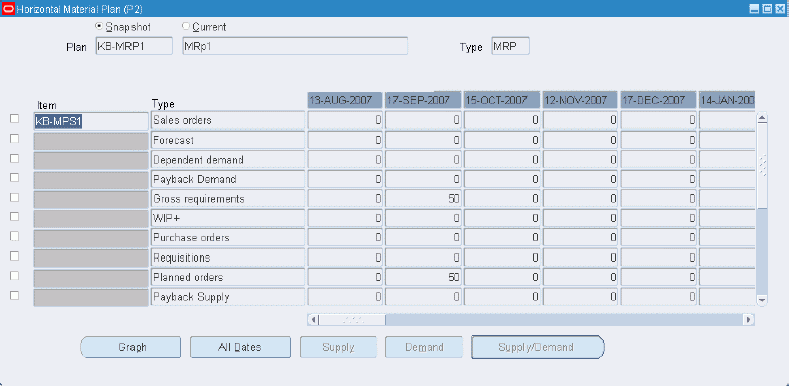
In the Planner Workbench, you can view project exceptions, the project horizontal plan, supply and demand per Project, simulate new or existing project demand, and release planned orders by Project. Planning Group and/or Project can be used as MRP planning criteria and as search criteria in the Planner Workbench. You can plan material requirements while respecting hard pegs on all supply orders and generate planned orders with Project references appropriately. Items can be soft or hard pegged, allowing for various pegging methods within a bill of material.
Project Supply/Execution
Project Planned Orders resulting from the planning cycle can include Purchase Requisitions/Blanket Releases for Buy Items (Project Procurement), WIP jobs/flow schedules for make items (Project Work in Process/Flow Manufacturing), and internal orders driven by inter-company supply.
Project Procurement
Project references are supported through all procurement entities such as RFQ, Quotations, Requisitions, Purchase Order, and Blanket Release for Inventory destinations. Expense destinations for Project Procurement are not currently supported. You cannot view commitments for a given Project since this functionality comes with Oracle Projects.
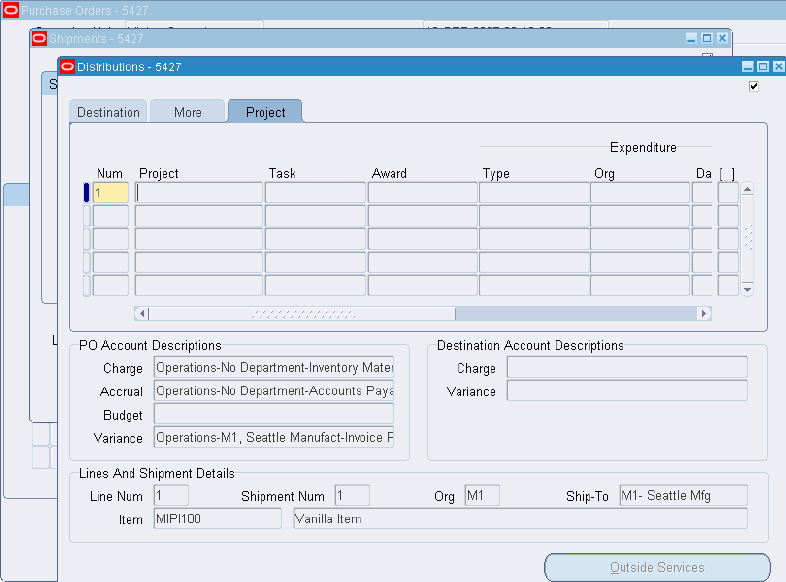
Project Work in Process
WIP jobs/work orders, both standard and non-standard are supported in a Project environment. Outside Processing functionality can be used with the Project reference on the Work order, which is then transferred to the generated outside processed purchase requisition. You can link Project Number to a flow schedule in a workorder-less production environment. Material issue, back-flush and completions can be executed for a Project with appropriate automatic defaults and validations for Project WIP jobs.
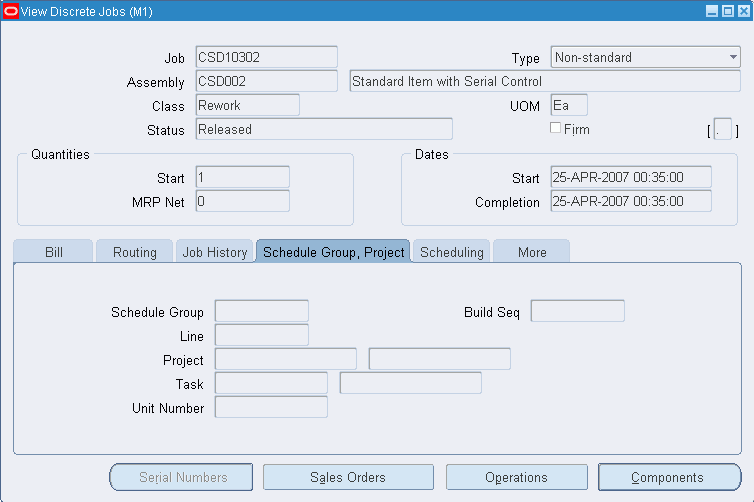
Project Inventory
In a Project environment, you can track inventory by Project, while dealing with transfers from one Project to another, or from common inventory to project inventory or vice-versa. Existing material transactions such as Miscellaneous Issue or Receipt, Subinventory Transfers, PO Receipt, WIP Issue, WIP Returns, or WIP Completions can be used to handle Project material transaction needs.
Project Quality
Using Oracle Quality, you can track Project related quality data. You can collect Project Number as a part of the quality data collection in a Project environment. Using the collected data, you can analyze the Quality information by Project. Project specific quality specifications can be set up and then referenced during quality data collection.
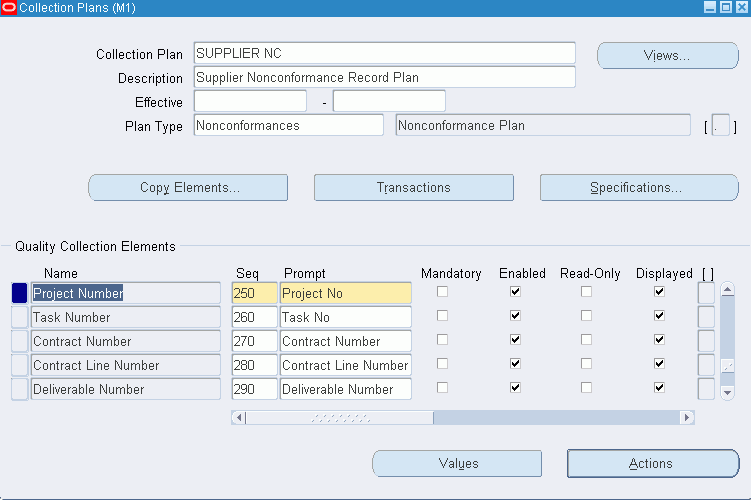
Project Costing Methods
Manufacturing labor, material, and overhead distributions are created in Oracle Cost Management as a result of WIP or Inventory transactions. If Oracle Project Manufacturing has been set up to use Weighted Average Costing, then Cost Groups are associated with each Project. Costs are tracked by Cost Group by item in each Project Organization. If Oracle Project Manufacturing is set up to use Standard Costing, then costs are tracked at the item level in each organization.
Project Analysis and Control
In a Project environment, use Project Manufacturing Inquiry to analyze manufacturing information. PJM Inquiry provides the drilldowns from a Project to the Purchasing, WIP, Cost, Planning, and Inventory details. Other existing reports (concurrent requests) which can be used to analyze seiban activity, include Inventory Valuation and WIP Valuation. Project Expenditure Inquiry or Project Status Inquiry (features of Oracle Projects) are not available to view cost details or summarization by Project since Oracle Projects is not installed in this environment.
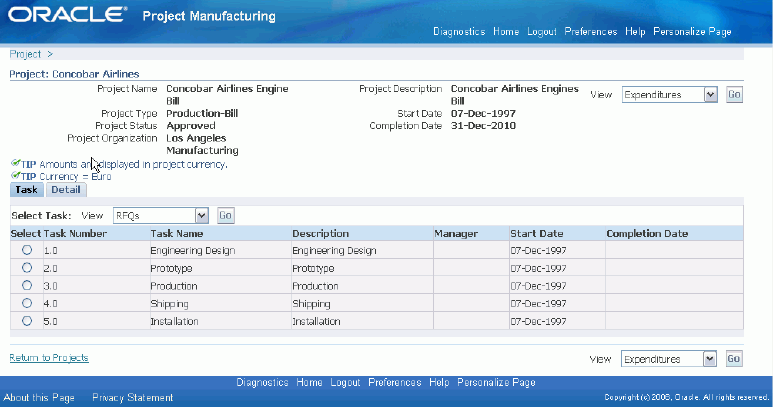
Project Billing
In Project Manufacturing, you have the option of driving billing activity into Oracle Receivables through Oracle Order Management or Oracle Projects. In a Project environment, you drive the billing activity through Oracle Order Management into Oracle Receivables, since Oracle Projects is not installed.
On completion of the shipment activity, you execute the Oracle Order Management cycle step Receivables Interface to pass the sales order line information into Oracle Receivables. In Oracle Order Management, order cycles are composed of distinct cycle actions. A cycle action indicates a processing step such as entering the order, reviewing the order for legal approval, or pick releasing the order. Cycle actions produce specific results for example, the action of entering the order can result in the order being partially entered or being booked.
Follow the standard procedure in Oracle Receivables to complete the billing process.
Project Revenue Recognition
In a Project environment, you recognize revenue using Oracle Receivables. The AutoInvoice Import or Master program is used to transfer transactions from Oracle Order Management into Oracle Receivables. You can also pass invoices, credit memos, on-account credits, and debit memos using AutoInvoice. Run the Revenue Recognition program in Oracle Receivables to generate the revenue distribution records for invoices and credit memos that are created in Receivables and imported using AutoInvoice. Then assign invoicing and accounting rules to recognize revenue over several accounting periods.
Summary
Table 1 summarizes the differences in the Project Manufacturing with Oracle Projects solution and Project solution (Project Manufacturing without Projects).
| Business Function | Step Description | Project Manufacturing with Oracle Projects | Project Manufacturing |
|---|---|---|---|
| Setup (Organization Parameters) | Project Reference | Enabled | Enabled |
| - | Project Cost Collection | Enabled | Not Enabled |
| - | Control Level | Project and Task | Project |
| - | Costing Method | Weighted Average Cost | Weighted Average Cost or Standard Cost |
| Project Definition | Work Breakdown Structure | The project with its WBS, can be defined in Oracle Projects or Project Management System | The seiban number is defined in the Define Seiban Number window in Oracle Project Manufacturing; A work breakdown structure is not defined |
| Project Demand | Project Demand (Order Management / Planning) | Demand entities include project and/or task references | Demand entities carry Project references |
| Project Supply / Execution | Project Procurement | You can enter project and/or task references on all procurement entities for inventory and expense destinations | You can enter Project references on procurement entities for inventory destinations only. Project procurement for expense destinations are not currently supported |
| - | Project Commitments | You can view commitments by project due to project related procurement in Oracle Projects | You cannot view commitments by Project since Oracle Projects is not installed |
| - | Project Work In Process | You can enter project and/or task references on Standard, Non-Standard Jobs and Flow schedules | You can enter Project references on Standard, Non-Standard Jobs and Flow Schedules |
| - | Project Inventory | You can support miscellaneous transactions and Inventory transfers with project and/or task references. Project Miscellaneous Transactions to issue/receive common inventory | You can support miscellaneous transactions and Inventory transfers with Project references; since Oracle Projects is not installed, you cannot perform Project Miscellaneous Transactions |
| - | Project Quality | Project and/or task references are supported in quality data collection, analysis and reporting | Project references are supported in quality data collection, analysis and reporting |
| Project Control and Analysis | Project Status Inquiry (PSI), Project Expenditure Inquiry | You can compare budget to actual at the project and task level using PSI. You can perform analysis by project, task, expenditure type, expenditure category and so on using the Expenditure Inquiry | Since Oracle Projects is not installed in a Project environment these inquiries are not available |
| - | Project Manufacturing Inquiry | You can view detailed or summarized manufacturing information for a given project and/or task | Project Manufacturing Inquiry allows you to view summarized and detailed manufacturing and cost information for a given Project Number |
| - | Other Reports | You can perform analysis at the project and/or task level using the Project Analysis Collection Pack and other Oracle Project reports | You can run standard reports such as Inventory Valuation, or WIP Valuation to track Project cost |
| Project Billing | Billing driven through Order Management to Oracle Receivables or through Oracle Projects to Oracle Receivables | You drive billing through Oracle Projects to allow the use of the multiple billing methods available in Oracle Projects such as event driven billing, progress billing, and so on | You drive billing through Order Management to Oracle Receivables. On completion of customer shipment in Oracle Order Management, run the Receivables Update program which passes the relevant sales order data to Oracle Receivables. You complete the billing activity using standard procedure in Oracle Receivables |
| Project Revenue Recognition | Revenue recognition in Oracle Projects or Oracle Receivables | Generate revenue in Oracle Projects using various methods including time and materials, percent complete, and cost plus | You perform revenue recognition in Oracle Receivables. By executing the Revenue Recognition program you generate the revenue distribution records for invoices and credit memos that are created in Receivables and imported using AutoInvoice |
Related Topics
Oracle Project Manufacturing User's Guide